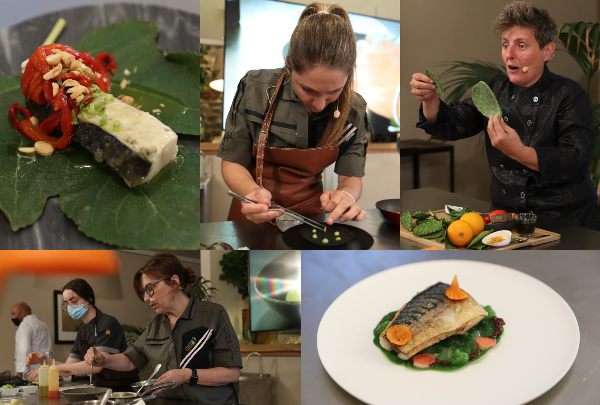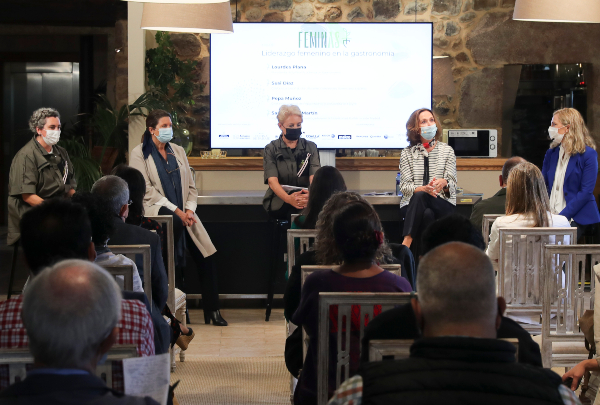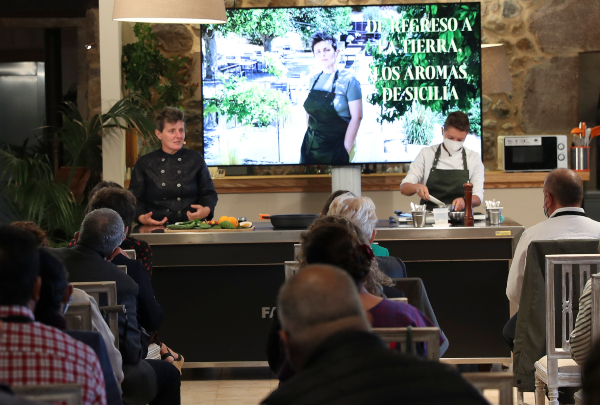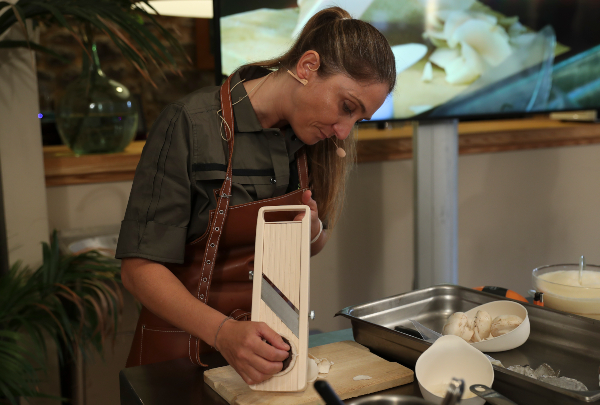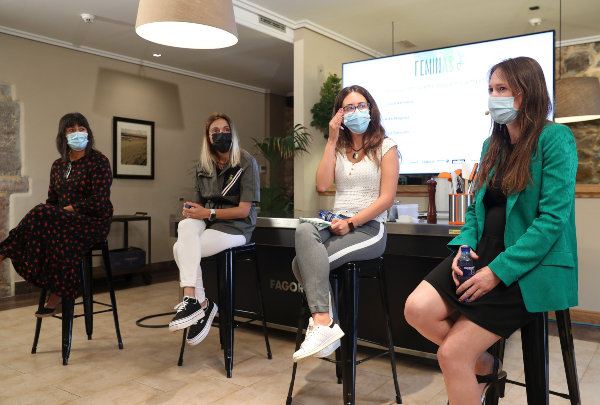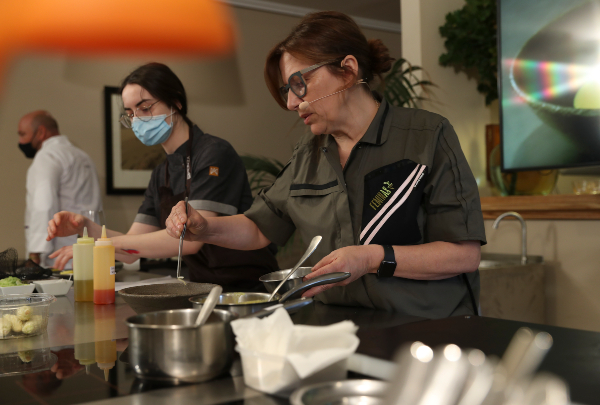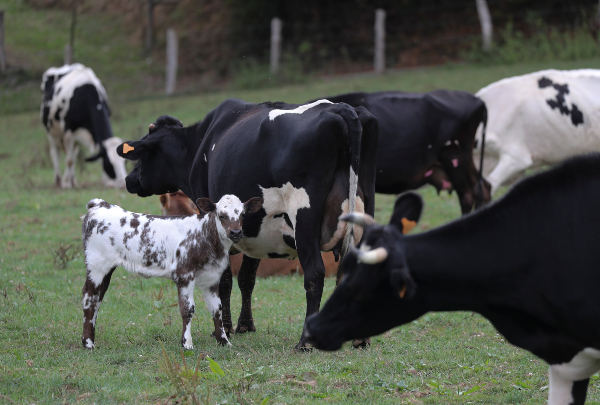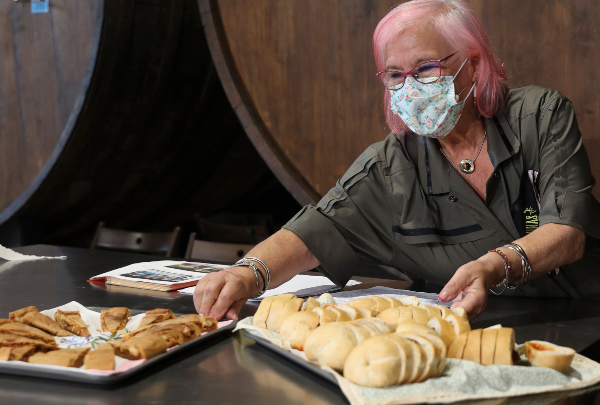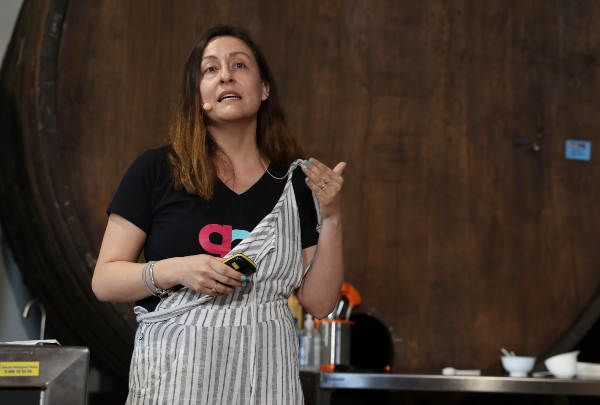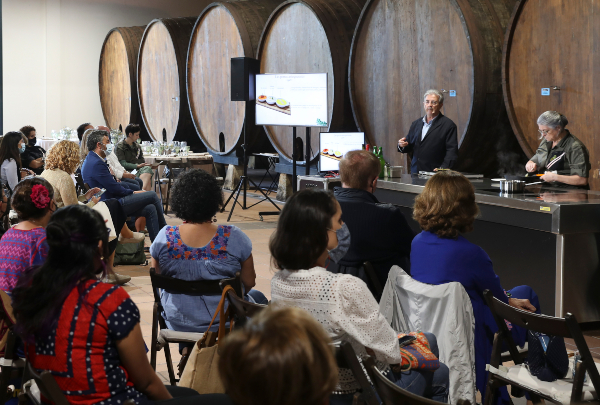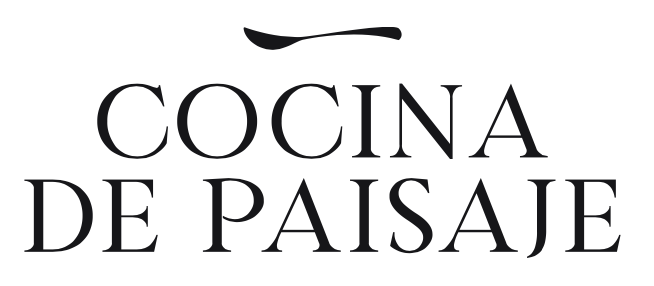News
This was FéminAs Talks

Some twenty speakers were at the Talks session.
Three minutes with a microphone for them to voice their opinion on the situation of women in gastronomy and the rural environment.
FéminAs held its Talks session on Monday afternoon in a room at Colunga's Jurassic Museum. An open-mike session of more than one hour of questions from journalists Benjamín Lana and Ana Vega, to which the guests freely expressed themselves on their view of the situation of women in gastronomy or the rural milieu, None of them held back, and neither did the few men at the event, who were met with amusing anecdotes. Their interjection of arguments and reflections helped to construct the narration.
Narda Lepes, chef
“I saw energy in my aunt when she was 64 years old, and when I opened my restaurant it occurred to me that I wanted that energy for the restaurant floor, and the information that waiters have. I knew there were plenty of these women, and I decided that I would only take that kind of woman for my business. They give diners conversation, understanding and connection".
Pablo Márquez, university professor
"Girls have different aspirations, but they're just as brave to abandon their lives and get into gastronomy. They definitely have a more holistic perspective of the sector, more willing to seek out new paths and new outlets, and even related professions that still have to be invented”.
Lourdes Plana, president of Spain's Royal Gastronomy Academy
“I have almost always been surrounded by women in my professional life. We're more polyvalent. We can sweep up or talk to the prime minister. And I'm going to do the same at the Academy. There's 50% on the board now. We can do things, and we can do more things than men can”.
Ruth Martínez, sales manager at Garçons
“Most of our chef coats have always been designed for men. When a female chef placed an order, we always adapted it. Now we've changed, and we've created
a chef coat for women”.
Viviana Varese, chef
“The situation of female chefs is quite similar. We have to work hard to create a group and bring more women into gastronomy. There are a lot of female chefs in Italy. There's a wide tradition of hospitality with the woman in the kitchen and the man working the floor. I work with all kinds of people, and I focus on diversity; it makes us more creative. We're all different, and we all make up a whole”.
Alexandra Sumasi, journalist
“French has a feminine format for the word "chef", and there should be one in Spanish too. I'd go for the word "chefa" [chefess]. Why not? There are fewer women in top gastronomy circles, not because they're not so good at it, but because they just don't want to live a tough life with no time for their family. Nowadays, the way things are going, if gastronomy hours change, there will be a lot more of them".
María Busta Rosales, chef
“I'm a chef, and I didn't give up on my family or my profession. I think they're both compatible”.
Laura Pintos, journalist
“I'm new to the world of gastronomy, and I'm fascinated. It's bigger than it looks. I'm finding interesting life stories here, with a lot of respect and values. I'm from Argentina, and I'm totally sure Spain is the best country for gastronomy”.
Charo Carmona, chef
“Girl or boy, what you need is willpower. Maybe I was lucky because I never came up against any obstacles because I was a woman. When a dish hits the table, no one notices who made it. All they notice is the passion”.
Justa Nobre, chef
“Portugal has good gastronomy and good fados. And both concepts are interrelated”.
Camila Ferraro, chef
“When I was at El Celler de Can Roca, I had 12 lads under me, and I used to say how easy it would be to set up my own restaurant. How wrong I was. I see that now. Running a restaurant is so different”.
Charito Cruz, chef
“I was lucky enough to have a good husband, who died eight months ago. Wherever he is, I know he'll be very happy with what's going on here in Asturias”.
Ignacio Medina, journalist
“The situation of female chefs in South America is not unlike the situation of female chefs elsewhere. I would only apply the word ‘artists’ in gastronomy to women who can come up with five recipes with some bread and an onion. There's a work/family gap between family chefs and restaurant chefs that prevents many of them from staying in the sector. And poor pay doesn't help”.
Lola Montes, communicator
“This congress brings all of us to the fore, and not just female chefs. In my profession, where I meet up with journalists, people in charge of restaurants, floor managers and the like, there are more women than men. At my company, for example, almost all of us are women”.
Amaranta Rodríguez, maître
“Women have a broader view than men. We can do more than three things at once”.
Rosa Rivas, journalist
“Villages have a better quality of life. I went to a little village in Cantabria just before the pandemic. and a lot of people would have envied that place. Sure, there were fewer facilities. But now we have fibre. If you're connected to the world, you have a good life. And communications could be better. These limitations cut short my visits to leading restaurants, and so I've been experiencing all the restaurants in the Community, and they're incredible. You have to visit what's closest to you”.
Guillermo Elejabeitia, journalist
“I see more ignorance in urbanites, who arrive and look down on the local people, while the people in the village are quite happy to explain to them what they're planting”.
Carlos Maribona, journalist
“It was always women who cooked at eateries in Asturias. It should also be said that this was partially because the men were working in the fields”.
Clara Pérez Villalón, chef and communicator
“When you go to a wonderful famous restaurant, you want the chef to be there. I don't care. What I do care about is what the food is like, the way the chef has stipulated that it should be like. It doesn't matter whether the chef's there or whether he isn't. At the "guisandera" restaurants, they're there all the time, and you notice that”.
Pamela Villagra, Chilean journalist
“We have to combat a number of gaps. The gender problem is present all around the world, and in all sectors. And gastronomy is no exception. What's important is to showcase female talent. And so, the objective a few years from now is for us not to be talking about gender, but about talent”.

